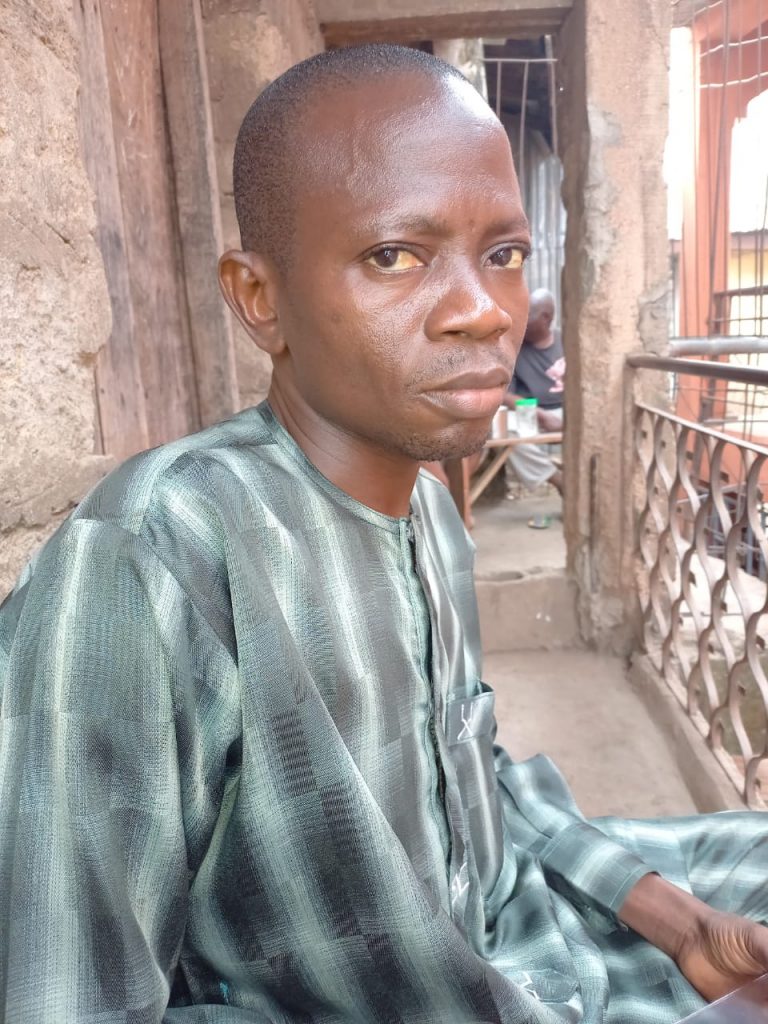By: Mujeebat Adewole
Ahmed Abdullah, a 41-year-old patient with sickle cell disease, shared his personal experience of living with the life-threatening illness since birth. He described the daily challenges and setbacks he faced as a result of his condition, revealing how the disease impacted his family and everyday life.
Abdullah, a father of three, talked about his ambition to become a medical doctor despite his health condition.
In an interview session with MUJEEBAT ADEWOLE, held in November 2022, he shared the obstacles he faced, including chronic pain, frequent hospitalizations, and limited physical activity.
Sadly, Abdullah passed away on January 21, 2023, at the age of 41.
Ahmed’s Early Years: A Childhood Dream Deferred
From a tender age, Ahmed dreamt of becoming a healer, a beacon of hope for those in pain. But his dreams seemed distant as sickle cell disease cast its shadow over his childhood. While other children played carefree, Ahmed faced endless hospital visits, chronic pain, and the crushing weight of societal stigma.
Abdullah talked about how sickle cell disease affected his childhood and ambitions of becoming a medical doctor.
Sickle cell disease is a genetic disorder of red blood cells that is passed down from parent carriers (AS father) and (AS mother) to their offspring. The disease causes the red blood cells to become sticky and lose their normal properties, leading to various problems that can result in sickle cell crises and complications.
Globally, approximately 50 million people are living with sickle cell disease, with Nigeria having the highest number of cases (approximately 4-6 million people, or 1 in every 4 Nigerians, have the sickle cell trait). Every year, around 300,000 newly diagnosed children with sickle cell disease are born worldwide, with Sub-Saharan Africa accounting for about 75% of the cases.
In Nigeria, there are approximately 100,000-150,000 newborns living with sickle cell disease annually, making the country a crucial player in the global epidemiology of the disease.
Abdullah wished that he could go back to his childhood days and create beautiful memories just like other children, but his health status limited him and he also faced stigmatization from people.
“How I wish, I could go back to my childhood days and make beautiful memories, just like I imagined. Managing myself with these conditions has not been easy, but who am I not to give glory to God? I never thought I would make it this far, but I did,” He said thankfully.
“Remember how I loved to gallivant around the neighborhood, prey on flying birds, dance just like my contemporaries and catch beautiful memories with them but my health status limited me, coupled with the stigmatization from people. Though I felt sad as a child, it built my tenacity and gave me the courage to live on,” the then 40-year-old Abdullah recounted.
Abdullah, however, narrated various challenges he faced while growing up as a sickle cell patient and how it has affected his education, ambition, and other aspects of his life.
“Sickle cell Anaemia is a threat to my life, remembering how it stands as an impediment to my career. Since my childhood, I have always wanted to be a medical doctor but the daunting status of my health was a hindrance to making my dream come true despite the efforts put in place.
Chasing Dreams Against All Odds
“After battling severally with my ‘O’ Level examination, I scaled true in 2002. I got admitted to the Kwara State Polytechnic to study Estate management but my father denied me the admission just because he felt I could not cope with the stress, I was bittered but I couldn’t do anything.
“In 2003, I was favored again; I got admitted to the Kwara State College of Education to study Islamic studies. Although I was not happy who am I to change the situation, I accepted fate and moved on with the course and graduated in 2006.

“I remember how I would prepare with maximum effort for my exams and when the day came, my crisis would start. This brings nothing but an excruciating moment to me, that I would feel the world should crumble on me but it never happened,” Abdullah narrated anguishedly.
“I saw myself as a failure because every effort made is always to no avail; it affected my education and my entire well-being. This ailment prevented me from taking a path through science, just because I cannot cope. As if that was not enough, I was unable to write my external exams. This creped my heart but there was nothing to do than to accept fate.”
Abdullah, who clocked 41 years old before his demise, shared how he lost his mother, who was his primary healthcare provider, during his NCE days. “While I was still pursuing my program at the College of Education, my mother passed away. Her death devastated me, but I had to accept the new reality and move on
“Losing my mother has been an ongoing source of pain for me, as she was the only person who truly understood my grief and pain without false empathy,” Abdullah shared as he recounted his experience, tears streaming down his face.
“How Sickle cell denied me many opportunities”
He recounted an incident where he was offered a job at the Nigerian Immigration Service, but his health condition prevented him from attending the training, and the stress made him step back.
“I had many opportunities in the past but my health condition drew me back. I remember when I got employed at the Nigerian Immigration Service, I couldn’t attend the training as my health condition was a hindering factor, the stress made me step back.
“There are several other things I left just because of my health condition but am still grateful because I am still a living man, if not for Allāh mercy I might not have the opportunity to be here.”
“I almost couldn’t get a wife“
Abdullah shared the challenges he faced in finding a wife to marry due to his health condition. He had difficulty getting a heart transplant due to the stigmas associated with it. However, he was fortunate enough to meet Balkis, his heartrob, who has been a great source of joy in his life.
Balkis has been a strong emotional and psychological support for Abdullah. She recognized his capabilities and helped him grow.
“Getting a heart Rob was indeed a herculean task for me, due to several stigmas from all and sundry. But since destiny can never be denied, I was blessed to meet my heartrob Balkis who has been a great source of joy to my life.
“She has been the one standing by me psychologically and emotionally. She knew my capabilities and helped me grow with that,” Abdullah shared.
Drugs, other medical bills gulp half of my little earnings
Abdullah shared the struggles he faces with his limited income as a primary school teacher.
Despite earning a modest salary, he is forced to allocate a significant portion of it towards his medical bills, which include the cost of his medication and other health-related expenses that may arise.
“I work as a primary school teacher, I earn a little amount of money but before spending a dime, I try to remove money for my drugs and other health-related issues that might surface.”
Medical experts react
Dr. Temidayo Afolabi, a healthcare practitioner, spoke about sickle cell disease and cautioned society against stigmatization. He encouraged people to embrace sufferers of the disease to help them live a productive and fulfilling life.
“Sickle cell disease is hereditary, with the trait of the ailment being passed down from parent to child. It is a genetic disorder that needs to be addressed to avoid causing damage to the heart of the sufferer. However, the disease should not be stigmatized.”
Dr. Temidayo spoke further about the issue of stigmatization, saying, “Sickle cell is not a barrier. In the past, sickle cell patients were stigmatized, but the world is now more civilized. Being a sickle cell patient does not mean that you cannot be a better version of yourself or that you cannot live a long life. From research and my experience in this profession, we have seen sickle cell patients who live long lives. The most important thing for us as medical practitioners is to take precautionary measures and provide proper health management. With these measures, sickle cell disease may not be life-threatening.”
“There are notable personalities who have sickle cell disease and are doing great things. Being a sickle cell patient does not make you irrelevant in society. It does not stop you from being whatever you want to be in life. We now have sickle cell patients in various fields of study.”
“Governor El-Rufai is a sickle cell patient and he has achieved great things. Therefore, you can be great too. Never let anybody put you down.”
Dr. Temidayo urged sickle cell patients to ignore negative energy and focus on growth. “Part of growth is setting healthy boundaries. Surround yourself with people who are supportive of your improvement and growth. You are unique and special in your own way.”
Also, Mrs. A.O Garuba, a pediatric nurse, shared her views as a medical practitioner and the need for society to be aware of the scourge.
“Sickle cell is no more strange, As it was in the past. However, it is not encouraging as we see couples falling victim to this scourge. Yes! Love is a beautiful thing, but it is not enough to be blindfolded, never let your happiness destroy another person’s life.
“On the part of stigmatization, it is high time we educate the society that sickle cell disease is not a life sentence, being a sickle cell patient does mean you have to suffocate yourself and think you are unrecognizable in society.
“Sickle cell is a trait, it is inherited from the parent. There are several dignitaries living with this disorder that live up to 90 years. So, proper health measures will go a long way.
Mrs. Garuba encouraged patients living with sickle cell disease to believe in themselves and ignore negative voices. Sickle cell disease is not a barrier to their greatness.
“There is no manual to this life, but some things are essential. At the top of that list is ‘self-love’. Love yourself so much that it becomes impossible for someone else to treat you badly.”



